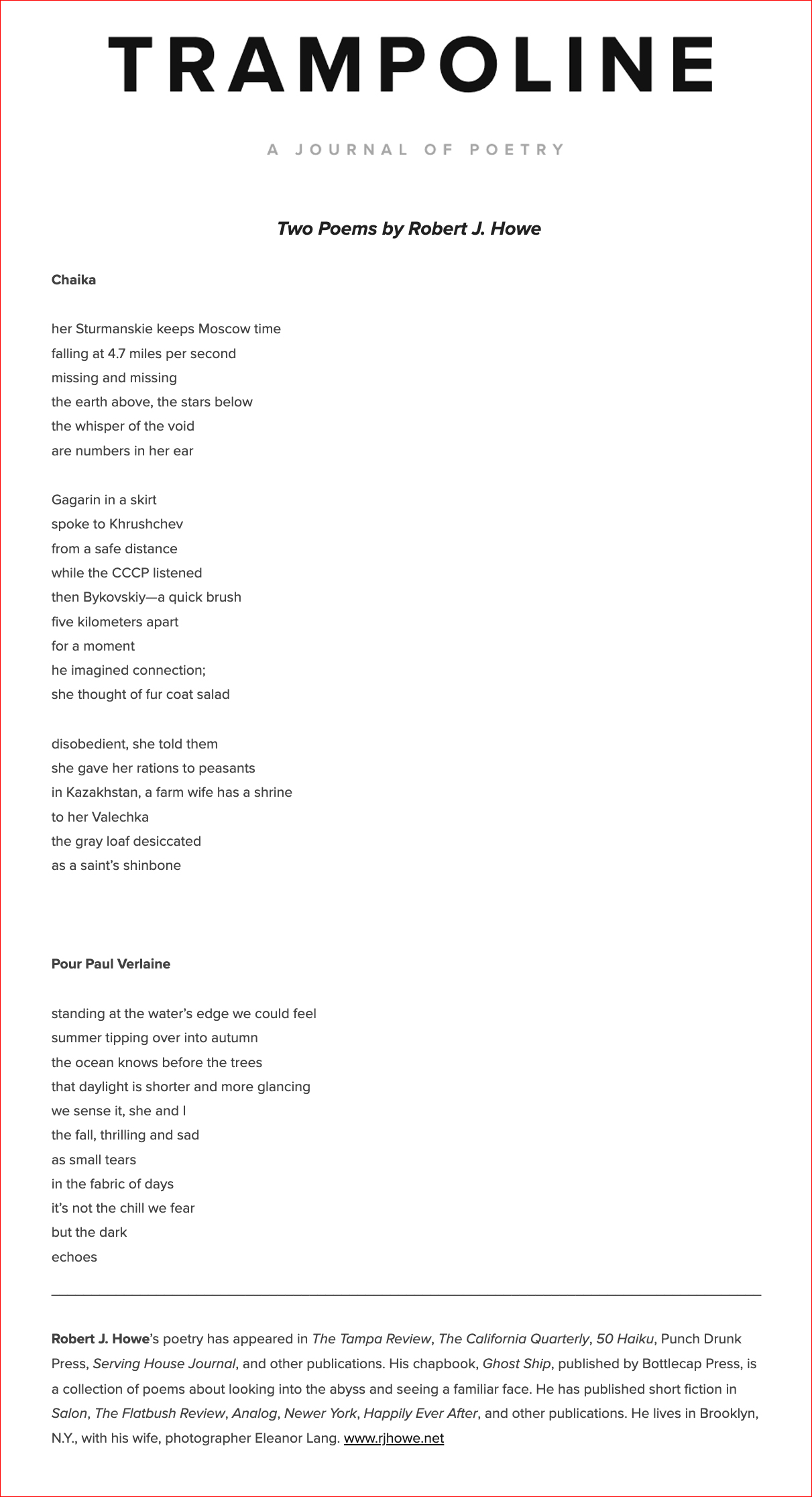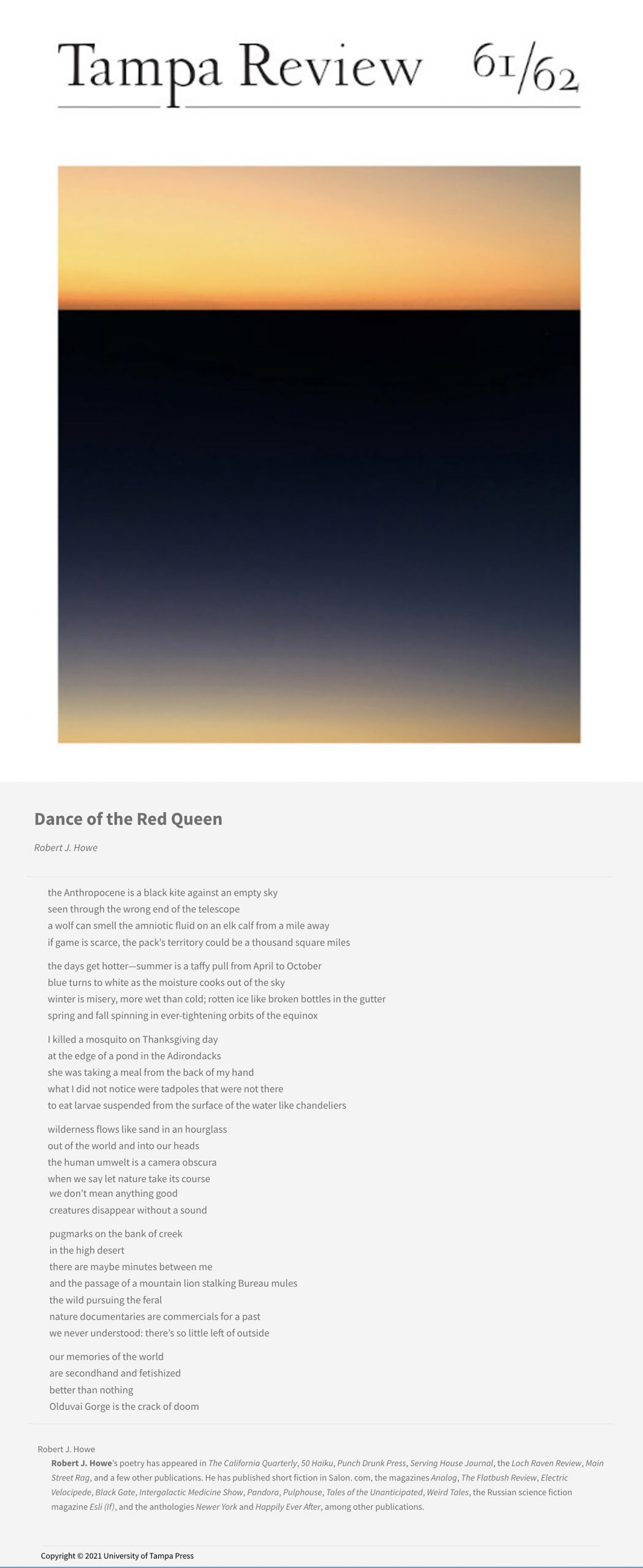New Poetry at Trampoline
- At January 06, 2025
- By Bob Howe
- In News, Poetry
 0
0
Two of my poems, “Chaika” and “Pour Paul Verlaine,” appeared in
Issue #25.9 of Trampoline, a New Orleans-based poetry journal.
Ghost Ship | Poetry Chapbook
- At July 04, 2024
- By Bob Howe
- In Blog Posts, News, Poetry
 0
0

Ghost Ship is a collection of poems about
looking into the abyss and seeing a familiar face.
25 Poems, 47 Pages
Print or Digital Copy
Booksellers
Order Direct from Bottlecap Press
Ghost Ship
Mary Celeste—soul in need of a captain
drinks White Claw in a dry bathtub,
wearing a life jacket over her cocktail dress;
when the oxygen masks drop she will don hers first.
Lovers may spend the night, but no one is allowed to leave
a toothbrush in her bathroom
has been standing in a water glass since the blizzard of 1996.
Her days are elastic between 10 a.m. and dinner;
bodega flowers make evening fall like an axe
on the neck of fire escape shadows.
The landlord cries when Mary Celeste will not allow the exterminator in;
she feeds the mice croissant crumbs
in the small hours of the morning.
The tread of the delivery man climbing three flights up
sounds like footsteps on a gallows;
she can taste the pleasantly acrid smell of vindaloo through the door.
There is a pizza slice of East River visible between the taller, more self-possessed buildings—
she sometimes wishes for an earthquake
to shake the equanimity of brightly colored yoga mats.
True fact: traffic noise is louder on the fourth floor;
the tractor-trailers from Ohio and Pennsylvania idle on First Avenue,
trucker caps waiting for the sun to illuminate supermarket windows.
Mary Celeste remembers
the West Village shop where she bought a Rothko reproduction
is now an urgent care with a green neon cross in the window.
There are bite marks on the arm of a wooden chair;
she doesn’t know how they got there, but sometimes
she hears a leopard roar in the night.
Across the river the stars come out over Astoria
she can see a fold in the terrycloth sky;
for a moment the universe is quiet.
![]()
WE WOULDN’T BE HAVING THIS CONVERSATION IF THE ROMANS HAD NUCLEAR WEAPONS
- At June 12, 2024
- By Bob Howe
- In Blog Posts
 0
0
The notion that men think about the Roman Empire every 14.3 minutes (or some other implausibly precise number of minutes) was making the rounds on social media recently. My fiancée even asked me how often I thought about the Roman Empire (not very, until now). If I know men who frequently ponder the Caesars, they’re not talking to me about it.
I was recently listening to The Rest is History, a podcast co-hosted by popular historians Tom Holland and Dominic Sandbrook. The episode was about Germany before 1933, and Hitler’s and the top Nazis’ ideology. In the podcast, Sandbrook speaks at length about Hitler’s belief in the racial, intellectual, and especially military supremacy of the Romans. In Nazi ideology, the Romans are the true Aryan forbears of the Volk—the German people.
When I heard this, the little refrigerator lightbulb went on in my head: “Oh, those are the men who frequently think about the Roman Empire!”
This is not to say the fanboys of the ancient Romans are all closet Nazis, nor that they necessarily have fascist tendencies. No, I think SPQR appeals to some men because it is a “safe” power fantasy, largely sanitized by two intervening millennia, and 70-odd years of Brits pretending to be Romans in sword-and-sandal epics. Rome sat astride the known world for roughly 10 centuries (Thousand Year Reich—sound familiar?). Romans built the Colosseum, the Aqueducts, and created a calendar, Roman numerals, bound books, and crucified a few troublesome rabbis along the way. Never mind that if a modern consumer of historical fiction were transported back to ancient Rome—or Greece, or pretty much anywhere in the ancient world—they would much more likely be helots than senators. Plus ça change…
My guess is that somewhere along a continuum between wanting a more important job and becoming a mass murderer, some men soothe their perceived impotence with thoughts of empire. Roman Empire. The fantasy isn’t the problem, of course: it’s the feelings of disempowerment and unacknowledged grief at one end of the spectrum, and homicidal rage at the other. And I don’t think think it’s confined to men. Women, including two of the three women on the Supreme Court, watch their rights being stripped away by men (and other women) who are nostalgic for the 1950s—or the 1930s: kinder, kirche, küche. Meanwhile there are nasty wars being fought on every continent but North America and Antarctica; wealth inequity is large and rising in the U.S.; and we have the lowest life expectancy at birth, higher death rates for treatable conditions, higher maternal and infant mortality, and among the highest suicide rates in the world.
So much in our day-to-day lives works against cultivating a sense of individual agency, and as you go down the economic ladder, the feelings are more acute. In the U.S., white rage at changing demographics certainly drives some of this unrest, but its causes are broader and even harder to address than racism: peak capitalism, frayed family and social bonds, economic insecurity, and loss of belief in human dignity. If I were a New York Times columnist, I would offer some simplistic solution culled from the wisdom of cab drivers, because what other kind of solution can one present in 800 words?
The kids are most definitely not alright. Never mind the precarity of civil liberties and economic health: in the next election, roughly half of the voters in the U.S. seem prepared to give control of the nuclear arsenal to a man with a long and public history of poor impulse control and disastrously bad judgment. Comparisons between Trump and Hitler are overwrought, but in one way, the dictator and would-be dictator are eerily alike:
Review: Black Snowflakes Smothering A Torch: How to Talk to Your Veteran – A Primer by Ryan Stovall
- At November 19, 2022
- By Bob Howe
- In Poetry, Reviews
 0
0
“having shot children” is the first line of the first poem in Ryan Stovall’s poetry collection, Black Snowflakes Smothering a Torch. War didn’t let him off easy, and his book isn’t letting us off easy.
Stovall served as a Green Beret (U.S. Army Special Forces) medic during the war in Afghanistan. Twice wounded, he has seen the elephant and been seen by it. He styles his collection a primer for civilians to speak to veterans about their experiences, but the poems also hold a mirror up to civilian life—and not in a flattering way:
I want to win the New way
the urban stylish civilized way
the learned pretentious academic way
the polite two-faced ingratiating way
the slap you on the shoulder
shoot you in the back way
if it will keep my memories at bay
then I will smile and smile
and be a villain
This is an intimate book. Stovall doesn’t digest war for the reader: he brings it back raw and sets it on the kitchen table, burned and red and leaking blood on the place settings. If you’re going to “talk to your veteran” (as he styles it), you need to taste some of war’s melancholic illogic, brute humor, and horror unfiltered. The title poem—the longest in Stovall’s collection—is a chain link fence of associations that marks the boundary between the civilian world and the world of war. Like most great poetry it is felt rather than understood: a shock wave that can leave the unarmored reader invisibly changed:
even some of us pipe-hitting HALO studs
return afraid of everything
from sudden movements
to failure
from disapproval
to dissecting aortas
to displaying cowardice
or courage
This book is not war tourism, and it is not easy—hardest, it seems, for Stovall himself (“some rocks should never be pushed aside”). His ambivalence about seeing and telling is part of what gives his poetry power and depth. Black Snowflakes is deeply humanistic approach to war writing that does not explain nor condescend. As poetry, as truth telling, as confessional, as jeremiad, this collection will live long in the attic of your soul.




